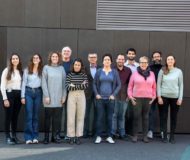

A new study reveals a therapeutic pathway that could improve the cardioprotective potential of “good” cholesterol (carried by HDL) in people with familial hypercholesterolemia, a genetic disorder that leads to very high levels of “bad” cholesterol (LDL). The study was conducted by researchers from the CIBER Diabetes and Associated Metabolic Diseases (CIBERDEM) and Cardiovascular Diseases (CIBERCV) areas of the Sant Pau Research Institute and the Hospital de Sant Pau in Barcelona.
Heterozygous familial hypercholesterolemia is a disorder primarily inherited due to mutations in the LDL receptor gene and is characterized by high levels of LDL cholesterol, often associated with low HDL cholesterol levels. Familial hypercholesterolemia is quite common, with an estimated prevalence of at least 1 in 250 people, and carries a high cardiovascular risk.
The study, led by Joan Carles Escolà Gil and Francisco Blanco Vaca, researchers from CIBERDEM at the Sant Pau Research Institute and Hospital de Sant Pau in Barcelona, has been published in the journal JACC: Basic to Translational Science.
PCSK9 protein inhibitors are among the most advanced and effective treatments for reducing LDL cholesterol levels and, consequently, cardiovascular risk. This new study has now identified a new metabolic pathway through which these PCSK9 protein inhibitors promote HDL’s ability to transport cholesterol from macrophages in the arterial wall and transfer it to LDL, allowing its subsequent elimination from the body through the liver, bile, and feces.
The study’s results show that functional alterations in the LDL receptor reduce cholesterol transport from macrophages and its elimination from the body, which can be reversed with PCSK9 inhibitors. Carla Borràs, the first author of the study and a researcher at CIBERDEM in the Sant Pau Research Institute, indicates that “the findings of this new study could open up new therapeutic possibilities to prevent cardiovascular risk in patients by increasing this metabolic pathway.”
Additionally, Marina Canyelles, co-first author of the study, from the same research group, states that “future research should analyze the effects of PCSK9 inhibitors on this pathway in other forms of hypercholesterolemia and their association with the reduction of cardiovascular events.”
Researchers from the Sant Joan University Hospital in Reus, the Institute for Biomedical Research of Barcelona/CSIC, the Ramón y Cajal University Hospital, and Finnish institutions such as the Wihuri Research Institute and the Minerva Foundation Institute for Medical Research also participated in the study.
Carla Borràs, Marina Canyelles, Josefa Girona, Daiana Ibarretxe, David Santos, Giovanna Revilla, Vicenta Llorente-Cortes, Noemí Rotllan, Petri T. Kovanen, Matti Jauhiainen, Miriam Lee-Rueckert, Luis Masana, Francisco Arrieta, Javier Martínez-Botas, Diego Gómez-Coronado, Josep Ribalta, Mireia Tondo, Francisco Blanco-Vaca, Joan Carles Escolà-Gil, PCSK9 Antibodies Treatment Specifically Enhances the Macrophage-specific Reverse Cholesterol Transport Pathway in Heterozygous Familial Hypercholesterolemia, JACC: Basic to Translational Science, 2024, ISSN 2452-302X, https://doi.org/10.1016/j.jacbts.2024.06.008. (https://www.sciencedirect.com/science/article/pii/S2452302X24002535)